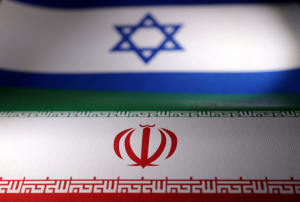Israeli prime minister, president work to mitigate the Jewish Agency crisis in Russia
Netanyahu blames the ‘amateurism, irresponsibility and arrogance’ of Prime Minister Yair Lapid and Defense Minister Benny Gantz for the crisis

Israel’s prime minister and president have been investing in diplomatic efforts to try to avert Moscow’s crackdown on the Jewish Agency in Russia, fearing its impact on aliyah, Jewish immigration to Israel.
The Russian Justice Ministry’s call to end the operations of the primary body that organizes aliyah possibly portends hardships for Russian Jews trying to leave for the Jewish state.
The ministry’s demand comes with allegations that the agency has violated Russian law, including by collecting information on Russian citizens and transferring the data. Moscow is expected to hold a preliminary court hearing on Thursday on the matter.
Israel had planned to send a delegation of diplomats and legal experts to speak with Russian authorities earlier this week, hoping to reverse the order. However, the delegation’s arrival was postponed after Russia stalled the process of granting visas to its members.
Israel believes the crackdown is politically motivated, given the Israeli government’s criticism of Russia’s onslaught on Ukraine.
Another reason could be related to the Israel Defense Forces’ operations in Syrian territory, according to Ynet’s senior writer Ron Ben-Yishai, a veteran war correspondent.
Syrian President Bashar al-Assad reportedly is growing frustrated with Russia overlooking Israel’s strikes and is demanding Moscow modify its policy.
Ben-Yishai quoted a senior Israeli official explaining that Russian President Vladimir Putin is wary of losing his strategic grip in the Middle East within Syria, amid a clash with the West over Ukraine.
The Kremlin seems to be “more attentive to Assad’s demands now than ever before,” the official stressed, adding that he believes that Russia is getting closer to Iran to try to circumvent western sanctions. A public clash with Israel is one way to signal to the Iranians that Moscow stands by them.
Russia, on the other hand, claims that the move to close the Jewish Agency should not be “politicized” and should solely be viewed as a legal matter.
Kremlin spokesperson Dmitry Peskov insisted on Tuesday that “the situation should not be politicized or projected onto the entirety of Russian-Israeli relations.”
“There are issues from the point of view of complying with Russian law. This situation should be treated very carefully, Peskov said.
In response, Israeli Prime Minister Yair Lapid issued a statement, saying, “If there are legal issues that arise in relation to the important activity of the Jewish Agency in Russia, Israel is, as always, ready and prepared to engage in dialogue while maintaining the important relations between the countries.”
Lapid emphasized that “the relations between Israel and Russia are based on a long history, regular communication and mutual interests.” He underlined that the Jewish community is at the “heart of these relations.”
Last week, Israel’s Channel 12 quoted Russia’s Ambassador to Israel Anatoly Viktorov, as saying in private that “Yair Lapid as prime minister could create problems for Israeli-Russian relations.”
Although the embassy later denied that report, it is known that Lapid has been a harsh critic of Russia’s actions in Ukraine as the first Israeli lawmaker to refer to them as “war crimes.”
This could be one reason why the Israeli premier has been handling this crisis alongside Israeli President Isaac Herzog.
An unnamed diplomatic official told Ynet that Herzog could be the one who will speak with Putin some time after the court hearing later this week. Prior to becoming Israel’s president, Herzog served as chairman for the Jewish Agency.
Herzog was quoted by The Jerusalem Post, saying, “Russia is an important country … there are different scenarios and reasons for why this event developed.”
The Israeli president said he preferred not to add more thoughts in order to not hamper the ongoing diplomatic process. “The less we talk, the better,” he said.
Meanwhile, opposition leader Benjamin Netanyahu piled criticism on Lapid and Gantz on Tuesday, blaming them in part for the “dangerous crisis” with Russia that puts Israel’s national security at risk.
“Stop the chattering; your behavior is endangering our national security,” he said of Lapid and Gantz.
“For years, we led a relationship with Russia that was measured, balanced and responsible,” Netanyahu said. “In recent days, I am worried that what we built over the years is being undermined. … It is happening because of a combination of amateurism, irresponsibility and arrogance.”
A spokesman for Lapid responded to Netanyahu's accusations.
“If Netanyahu had bothered to come to Prime Minister Lapid for security and diplomacy updates, Netanyahu would have known the facts,” he said, adding that “for the benefit of the security of the State of Israel and Russian Jewry, this is an issue that must be handled discreetly and through government channels, and not in press conferences.”
As opposition leader, Netanyahu has the right to receive security briefings from the prime minister, but he has continued to refuse them over the past year from former Prime Minister Naftali Bennett and now Lapid.

Tal Heinrich is a senior correspondent for both ALL ISRAEL NEWS and ALL ARAB NEWS. She is currently based in New York City. Tal also provides reports and analysis for Israeli Hebrew media Channel 14 News.













